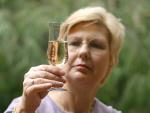Hidden hazards of wine tasting exposed
Adelaide researchers are studying the hazardous side of professional wine tasting. Wine makers, wine judges and wine marketers' chosen profession puts them at a higher risk of tooth erosion, but it is a problem that can be reduced, according to Dr Diane Hunt, a senior lecturer in Restorative Dentistry at the University of Adelaide. Tooth erosion can affect anybody's teeth. It is an irreversible process, which rapidly occurs when acids, commonly from food and drink, are present in the mouth. When these acids are present and the pH level of the solution that bathes the teeth gets below 4.5 teeth start to erode. The acids dissolve calcium and phosphate from enamel surfaces and expose the dentine, which is a very sensitive tooth material, causing tooth sensitivity. Because the pH level of wines can range from 3.2 to 3.8, with sparkling wines as low as 2.8, instantaneous erosion can occur in susceptible people. "This is an occupational health hazard for wine assessors," Dr Hunt said. Dr Hunt has been researching the dental problems associated with professional wine tasting and what can be done to reduce the damaging effects of wine on professionals' teeth. "As dentists, our interests are to find ways of reducing tooth erosion and promote the natural protection provided by saliva," Dr Hunt said. "Saliva determines the oral balance within the mouth and helps flush away and dilute any acids. It forms a protective 'film' (known as glycoprotein pellicle) and also has certain 'buffering' properties, which will kick in when the pH gets lower and lower." Dr Hunt said a simple and beneficial way to stimulate saliva is by chewing sugar free gum. "Chewing gum for 10 minutes has been shown to dramatically increase the amount of saliva that is produced. Stimulated saliva is also much richer in calcium and phosphate, which are the minerals that are dissolved from the teeth by the erosive process," she said. On days of intense wine tasting, wine assessors should take some measures to protect their teeth, Dr Hunt said. "We have shown that with the application of concentrated fluoride gels the night before a tasting, it is possible to considerably reduce erosion," she said. "We also suggest that on mornings of a wine tasting session, instead of brushing their teeth, they leave the plaque, which helps to protect the enamel. "Throughout the day they should ensure they drink plenty of water so saliva production is optimal. After wine tasting, they should not brush their teeth for at least one hour to avoid wearing away the softened tooth surface, but do remember to brush." Dr Hunt and colleague Dr John McIntyre have conducted a survey of professional assessors, ranging in age from 20 up to 60 to see how many of those had sensitive teeth. "Out of 74 people, 50% didn't experience sensitive teeth and 50% did. The curious thing was, differences in exposure to wine tasting alone did not account for the difference between these two groups. The most obvious answer relates to differences in quality and quantity of saliva," she said. Dr Hunt's research into this area has been funded by the Australian Dental Research Foundation, but she said it had been difficult to get the wine industry involved so far. "There is definitely an opportunity for some cooperative work with industry in this area, and we believe it will have positive benefits for professional wine tasters right around Australia
and overseas." Story by Natalie De Nadai
|




